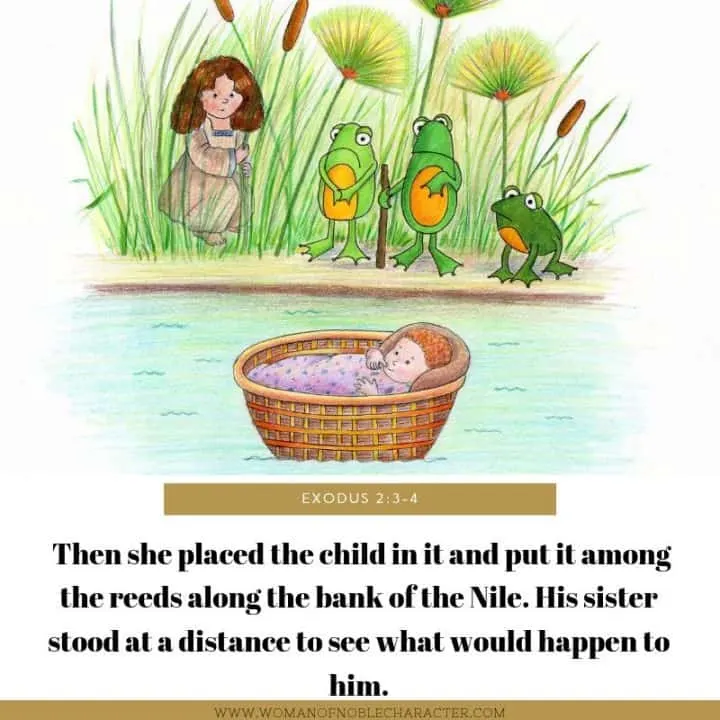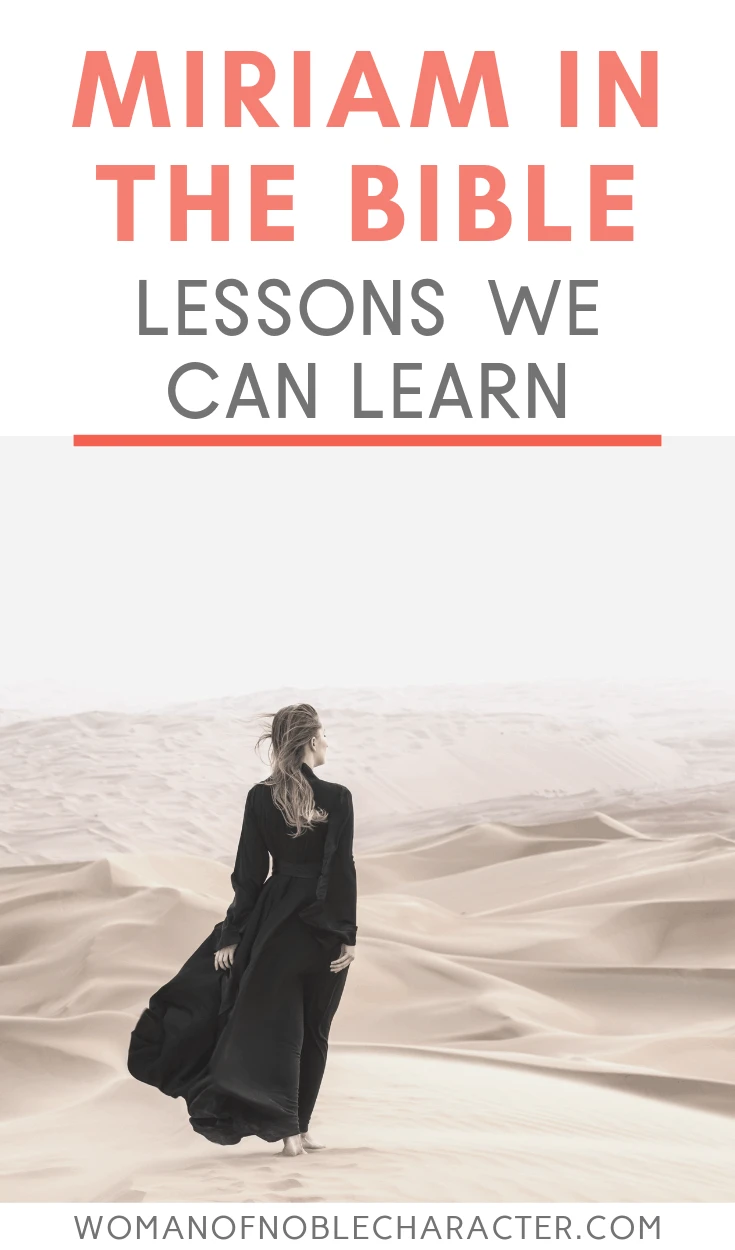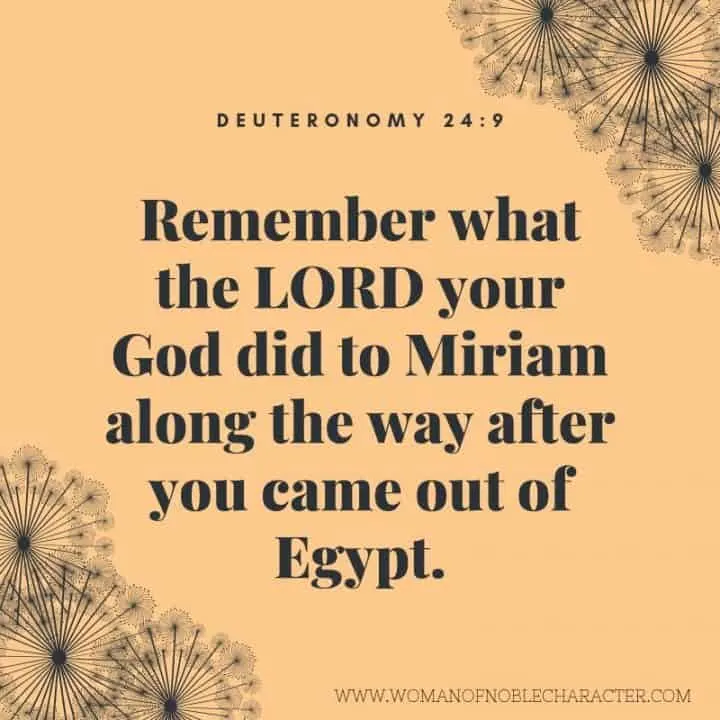This page/post may contain affiliate links. As an Amazon Associate, as well as an affiliate of other programs, this means if you purchase something using these links, I will receive a commission on qualifying purchases at no cost to you! For more detailed information, please visit our Affiliate Disclaimer page
As we continue our series on women in the Bible, I would be remiss if I didn’t include Miriam in our study. Miriam is a portrait of courage, deep family connections, leadership and a faithful life. On the other hand, she is a portrait of the effects of gossip and words that tear others down.
(Other posts in the series on women of the Bible include: Sarah, Elizabeth, Deborah, Martha, Ruth and Esther.)
If you are not familiar with the story of Miriam in the Bible, let’s do a quick recap.
The Story of Miriam in the Bible
Miriam (מִרְיָם Mir-yām) was born in 1576 B.C. and is the daughter of Amram and Jochebed, and the sister of Moses and Aaron. She was described as a prophetess, and, in fact, is one of the seven major female prophets in the Bible. (The other Prophetess’ are: Sarah, Deborah, Hannah, Abigail, and Esther and Huldah).
A Loving Sister
We are first introduced to Miriam as she and her younger brother, Aaron, welcome a new baby boy to the family. His name was Moses. It is believed that Miriam was around five years’ old, and Aaron three, when Moses was born.
Unfortunately, Moses was born during a time that a decree was in effect demanding that all Hebrew baby boys be killed.
Miriam had parents with strong faith, however and trusted God.
Her mother was able to hide Moses for three months, but when she could no longer hide him, safely, she knew she needed to find a way for him to escape Pharaoh’s wrath. She found a papyrus basket for him and coated it with tar and pitch to make it waterproof. She then placed Moses in the basket and hid it in the reeds along the bank of the Nile river.
Big sister Miriam stood by and watched to see what would become of her baby brother.
“Now a man of the tribe of Levi married a Levite woman, and she became pregnant and gave birth to a son. When she saw that he was a fine child, she hid him for three months. But when she could hide him no longer, she got a papyrus basket for him and coated it with tar and pitch. Then she placed the child in it and put it among the reeds along the bank of the Nile. His sister stood at a distance to see what would happen to him.” – Exodus 2:1-4
Soon after, Pharaoh’s daughter, Bithiah (also spelled Bitya) went down to the river to bathe, she saw the basket and sent a slave girl to fetch it. Once she opened the basket and saw baby Moses, she immediately fell in love with him and decided to keep him and raise him as her own.

Miriam, who stood watching, courageously stepped forward and offered to find a Hebrew woman to nurse the baby for Bithiah. Miriam ran to tell her mother and Mose’s very own mother was compensate to nurse him and care for him until he was weaned.
A Strong and Caring Leader
When it was in God’s perfect timing to deliver the Israelites from bondage, He chose Moses to carry out His will.
By this time, Moses, had been living in Midian and had a wife and two sons. He spent his days tending his father-in-law’s flocks.
So, with instructions from God, Moses returns to Egypt. His brother Aaron is to be his spokesman. Together, they communicate to Pharaoh God’s commands to free the Hebrews.
Miriam witnessed the great miracles God performed through Moses.
She was also part of the huge throng of people to cross the parted Red Sea. She looked back, after passing, and watched as the chariots and Pharaoh’s army were swallowed into the sea.
The Israelites were finally free from brutal captivity and it was a time to rejoice!
Exodus 15 gives us the first song recorded in the Bible, which was penned by Moses. It is a song of praise from a freed people.

This song, known as The Song of Moses and Miriam, was written in praise and worship to God for redeeming the Israelites. It is found in Exodus 15:1-18
“I will sing to the Lord,
for he is highly exalted.
Both horse and driver
he has hurled into the sea.“The Lord is my strength and my defense;
he has become my salvation.
He is my God, and I will praise him,
my father’s God, and I will exalt him.
The Lord is a warrior;
the Lord is his name.
Pharaoh’s chariots and his army
he has hurled into the sea.
The best of Pharaoh’s officers
are drowned in the Red Sea.
The deep waters have covered them;
they sank to the depths like a stone.
Your right hand, Lord,
was majestic in power.
Your right hand, Lord,
shattered the enemy.“In the greatness of your majesty
you threw down those who opposed you.
You unleashed your burning anger;
it consumed them like stubble.
By the blast of your nostrils
the waters piled up.
The surging waters stood up like a wall;
the deep waters congealed in the heart of the sea.
The enemy boasted,
‘I will pursue, I will overtake them.
I will divide the spoils;
I will gorge myself on them.
I will draw my sword
and my hand will destroy them.’
But you blew with your breath,
and the sea covered them.
They sank like lead
in the mighty waters.
Who among the gods
is like you, Lord?
Who is like you—
majestic in holiness,
awesome in glory,
working wonders?“You stretch out your right hand,
and the earth swallows your enemies.
In your unfailing love you will lead
the people you have redeemed.
In your strength you will guide them
to your holy dwelling.
The nations will hear and tremble;
anguish will grip the people of Philistia.
The chiefs of Edom will be terrified,
the leaders of Moab will be seized with trembling,
the people of Canaan will melt away;
terror and dread will fall on them.
By the power of your arm
they will be as still as a stone—
until your people pass by, Lord,
until the people you bought pass by.
You will bring them in and plant them
on the mountain of your inheritance—
the place, Lord, you made for your dwelling,
the sanctuary, Lord, your hands established.“The Lord reigns
for ever and ever.”

According to Exodus 15:20-21, Miriam took a timbrel in her hand and lead the women in music, song and dance to celebrate God delivering them to safety.
“Then Miriam the prophet, Aaron’s sister, took a timbrel in her hand, and all the women followed her, with timbrels and dancing. Miriam sang to them:
“Sing to the Lord,
for he is highly exalted.
Both horse and driver
he has hurled into the sea.”
Miriam, the Prophetess
While we don’t find much scripture surrounding Miriam in the role of prophetess, she is described, along with her brothers, Moses and Aaron, as delivering the Jews from slavery in Egypt:
“I brought you up out of Egypt
and redeemed you from the land of slavery.
I sent Moses to lead you,
also Aaron and Miriam.” –
Michah 6:4
She is mentioned as prophetess in Exodus 15:20-21, above and in Numbers 12 as well.
It is believed that as Moses taught the men the Torah, Miriam led the women and taught them, too.
Punished with Leprosy
Miriam, over time, became hungry for more power. Moses, of course, was chosen by God to lead the people and Aaron to be the high priest. Miriam, as we know, was considered a prophetess, but she wanted more and became restless.
She started to question Moses and speak against him. Both she and Aaron had some rough things to say about Moses’ Cushite wife, too.
The Lord, Who hears all, decides to discipline Miriam by striking her with leprosy.
The Well of Miriam
We can assume that Miriam had an attitude adjustment after the leprosy incident. She lived for another thirty eight years and, the Bible never again mentions her questioning Moses, his authority or his wife. In fact, Miriam is not mentioned again until she dies, never reaching the Promised Land. She is believed to be around 130 years old at the time of her death.
In Numbers 20:1, we read about Miriam’s death and immediately following we read that the Israelites have no water.
“In the first month the whole Israelite community arrived at the Desert of Zin, and they stayed at Kadesh. There Miriam died and was buried. Now there was no water for the community, and the people gathered in opposition to Moses and Aaron.”
Bible scholars make the correlation between Miriam’s death and the lack of water and come to the conclusion that, for the forty years prior, they had consistent water to the credit of Miriam. They believe that Miriam’s death cause the well to dry up.
Hebrew experts point out that the Talmud explains that Miriam, Aaron and Moses were responsible for the three gifts the Jews had in the desert—the well of water, the pillar of clouds and the manna, respectively.
Miriam’s Well (Be’erah shel Miriam) is the name the Hebrews gave to the spring that provided water and throughout the 40 years the Israelites traveled in the wilderness.
So those are the stories in the
that give us a glimpse of who Miriam was and her importance in the history of our faith.

Now that we have had a refresher on Miriam and where she is found in the Bible, let’s look at some lessons from Miriam and her life.
As with most of the women we read about in the Bible, the story of Miriam can teach us so much.
Lessons from Miriam in the Bible
The lessons we can learn from Miriam are both lessons on what to do and what not to do.
1. Have Courage
For a little girl, only five years’ old, Miriam displayed incredible courage when she approached Pharaohs’ daughter about finding someone to nurse baby Moses. Can you imagine the boldness in this child?
Although, at the time of Moses’ birth, Deuteronomy won’t be written for many years to come, this verse comes to mind when I read this story of Miriam in the Bible:
“Be strong and courageous. Do not be afraid or terrified because of them, for the Lord your God goes with you; he will never leave you nor forsake you.” – Deuteronomy 31:6
I have a child like Miriam. He wasn’t afraid of anything, which, as his mother, absolutely terrified me, at times!
If you could have the courage of Miriam and step out in faith, what would you do right now? What is stopping you knowing that Psalm 27:1 tells us:
“The Lord is my light and my salvation—
whom shall I fear?
The Lord is the stronghold of my life—
of whom shall I be afraid?”
2. Be a Good Sibling
I don’t have any brothers or sisters, so this one is a bit tough for me to relate to, but I am struck by the fact that Miriam, even as a child, felt protective over her baby brother and risked so much in approaching daughter of Pharaoh on his behalf.
Would you do the same for your brother or sister now that you are an adult?
It’s one thing to stand up for them to a bully in grade school, but another, entirely, to gently guide, correct and hold them up as an adult.
Consider what we read in Philippians 2:3-4
“Do nothing from rivalry or conceit, but in humility count others more significant than yourselves. Let each of you look not only to his own interests, but also to the interests of others.”
Ask God today to reveal to you how you can be a good sibling and mirror our ancestor Miriam.
3. Thank God for Each and Every Blessing and Trial You Have
Do you thank God for your blessings (and trials)? Many Christians do, but they do so with a blanket statement. Something along the lines of “Thank you, God, for all you have given me”. That’s great and it’s a start but, it’s really just a start.
When we look at the Song of Moses and Miriam, we see it is filled with specific reasons for thanksgiving and praise:
I will sing to the Lord, for he is highly exalted. Both horse and driver he has hurled into the sea, for example. They are listing out what God did and thanking Him for each.
Let’s learn from their example and when you pray, thank God for the roof over your head, the food you have to eat, the health of your family and your church.
Thank Him also for the difficulties that you face in life. Although it was tough, at first, I gave thanks to God for my cancer, as that time drew me closer to Him than ever before.
“Give thanks in all circumstances, for this is God’s will for you in Christ Jesus.” – 1 Thessalonians 5:18
4. Be a Leader
Miriam taught women about God and after being delivered out of slavery led the women in song and music. She was a leader. She was someone that others wanted to be around and follow.
When you look at how you interact with others, are you someone that others want to be around and follow? Or are you bitter, angry, bossy or even passive?
Leaders don’t sit back and watch. Miriam didn’t just accept that her brother would float down the Nile to uncertain circumstances. Instead, she watched and took action when she saw Pharaoh’s daughter’s slave retrieve Moses’ basket from the water.
Do you sit back and let others do all the work? or do you step up and take action?
Perhaps, you don’t feel called to lead a group or an organization. You can still serve the Lord in leadership in other ways.
Look to Titus 2 for inspiration:
“Likewise, teach the older women to be reverent in the way they live, not to be slanderers or addicted to much wine, but to teach what is good. Then they can urge the younger women to love their husbands and children, to be self-controlled and pure, to be busy at home, to be kind, and to be subject to their husbands, so that no one will malign the word of God.” – Titus 2:3-5
Can you lead young women to stronger marriages and a deeper walk with God?
5. Use Your Gifts for God’s Glory
God gives us each unique gifts. We are bestowed these gift to use for God’s glory and to advance His Kingdom.
Miriam discovered that she had been given the gift of prophecy and used this gift to help lead the Israelites to the Promised Land, along with her brothers, Moses and Aaron.
She had a willing, servant attitude.
The Lord has given you gifts and want you to use them to glorify Him, just as He used Miriam.
What gifts has God given you? How are you using them for Him?
If you aren’t sure or are trying to discern His will in your life, see this post on finding your calling.
“Each of you should use whatever gift you have received to serve others, as faithful stewards of God’s grace in its various forms. If anyone speaks, they should do so as one who speaks the very words of God. If anyone serves, they should do so with the strength God provides, so that in all things God may be praised through Jesus Christ. To him be the glory and the power for ever and ever. Amen.” –
1 Peter 4:10-11
6. Quit Complaining
Miriam, although, for years a faithful servant, developed a bitter heart and began to complain about her brother Moses and his wife. God hears everything and felt that Miriam deserved punishment for her harsh treatment of her brother and his wife.
She is stricken with leprosy, and removed from camp for a full week.
God intended for her to reflect and repent. She must have felt humiliated and embarrassed for her behavior.
Scholars believe that Miriam’s leprosy was viewed by the Hebrew people as a confirmation that Moses was chosen by God to be the leader of the Israelites and that even though Miriam and Aaron were important to the story, they were subservient to Moses.
Are you one to complain? Do you gripe about others and your circumstances?
I’m not saying that if you do, God will afflict you with leprosy or another disease, but God’s punishment of Miriam is a powerful example of how God despises complaining. He takes it as a personal affront. When we complain, we are not merely complaining about others, but God, Himself.
“Moses also said, “You will know that it was the Lord when he gives you meat to eat in the evening and all the bread you want in the morning, because he has heard your grumbling against him. Who are we? You are not grumbling against us, but against the Lord.” – Exodus 16:8
7. Don’t Talk Bad About Others
This one is related to complaining, but distinctly different. Miriam was badmouthing Moses and his wife. God makes it abundantly clear that we are to use words that build up and not tear down another.
He also is straightforward in his feelings about gossip.
Do you have a tendency to gossip or talk about others?
While I don’t gossip, God has convicted me that sometimes I can be unkind in my talk about others. I may mention to my husband “Can you believe that so and so did such and such?” or “The way blank treats her husband is awful”.
That is not wholesome talk, nor is it any of my business. I’m a work in progress on this one, if I’m being honest, my friends.
What about you? Is God telling you anything right now?
“Do not let any unwholesome talk come out of your mouths, but only what is helpful for building others up according to their needs, that it may benefit those who listen.” – Ephesians 4:29
“‘Do not go about spreading slander among your people. Do not do anything that endangers your neighbor’s life. I am the Lord.” – Leviticus 19:16
8. Faith is a Blessing for Future Generations
We know that Miriam was strong in her faith and, according to Hebrew tradition, women passed their faith on to their children. We also surmise from biblical scholars and as referenced above, that Miriam taught other women about the Torah.
Her teaching to other women was instrumental in passing the faith down to generation after generation.
Faith begins in the home. It’s one thing to take your children to church and to Sunday school or VBS. It’s another thing, entirely, to demonstrate true faith in Jesus in your home. Children are more likely to model your behavior than they are to act on your words.
Are you blessing future generations by teaching your children (and possibly others) about God?
One generation commends your works to another;
they tell of your mighty acts. –Psalm 145:4
Interesting Facts About Miriam
- Miriam (possibly translated as Mary in English) means ‘bitter’ although it could also signify ‘one who loves or is loved by Yahweh’‘.
- The historian Josephus claims that Miriam married Hur, Moses’ close friend.
- Other documents point to her as the mother of Hur and the wife of Caleb.
- Cush is not far from modern-day Ethiopia, which would mean that Moses’ Cushite wife most likely had dark skin. Most scholars agree that dark skin was highly valued at that time, and Miriam’s behavior toward her was caused by jealously, rather than based on anything concrete.
- In addition to biblical mentions, other ancient Jewish literature refers to Miriam. She is referred to in the Old Testament Pseudepigrapha, the Dead Sea Scrolls, in the texts of Flavius Josephus and Philo of Alexandria, and other rabbinic literature.
Bible Verses About Miriam and Her Key Life Events
Grab your free downloadable and printable PDF with Bible verses about Miriam. Use them for deeper study, scripture writing or for use in your War Binder or Bible journaling.
For further reading about Miriam in the Bible and study, you may enjoy this book about Miriam and other women prophets.
Mesu Andrews, one of my favorite Christian fiction authors, has a terrific book about Miriam.
Or listen to them on Audible Plus with a free trial!
What is God telling you about Miriam in the Bible and what we can learn from her? Do you have a book recommendation about Miriam? I’d love to hear from you!
Because of Him,
Sue
